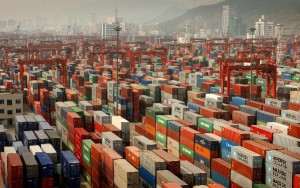China released economic growth numbers for the July-to-September (Q-3) period, yielding its slowest quarterly growth since the 2009 financial crisis. The country’s economy grew 6.9%, due to significant stock market volatility and “a deepening industrial rout” (nytimes.com). The recent uncertainty surrounding China’s slowing growth has battered the global equities markets and has led to investors questioning the accuracy of Chinese economic data, these fears have been furthered through “China’s botched attempts to prop up its stock market in July and the surprise move in August to devalue its currency by the most in nearly two decades” (nytimes.com).
One, direct internal cause for China’s slowing pace is the conversion of its primary growth drivers (manufacturing and housing construction) to some of the biggest drags on the economy. The country’s industrial production “rose 5.7 percent in September, near its slowest pace since the financial crisis” (nytimes.com). The Chinese government is now depending on rising consumer demand, in wake of the country’s urban development and growing middle class. While retail sales rose “10.9 percent in September,” (nytimes.com) increasing consumer spending could not offset China’s industrial slump.
Many believe that this fettered expansion will encourage China’s central bank to lower the reserve ratio and cut interest rates, an action the communist government has carried out five times since last November, in order to aid the economy. It is apparent that a significant amount of the China’s slowdown has been self-imposed over the past five years, as communist leaders work to “steer the economy to more self-sustaining growth based on domestic consumption and the service industry instead of trade and investment” (Aljazeera.com).
Global investors will be keen to observe China’s future economic growth and the forecasted numbers the communist government will release in the coming quarter in response to a slow quarter. The further decrease in the country’s expansion could have wide-spread financial implications, and equity holder will want to keep a close eye on China in the coming years.
The graph appears to show growth slowing over the past couple of years. Is this new deceleration of growth happening too quickly, and at what point will the growth stabilize are the important questions for China.
Would lower interest rates affect businesses such as our bra ring manufacturer in Lishui? That is, how would monetary stimulus actually work? (Remember, too, that in the US growth remains anaemic 7 years after the collapse of Lehman Brothers – pinpointing the causal channel still leaves the empirical question of whether that channel will serve as an effective conduit in today’s macroeconomic environment.
Second, is slower growth a bad thing? Or – at 6.9% in the latest statistical release – is growth really slow??
Will lower growth affect the tolerance of the Chinese people? That is to say, will citizens, chiefly the middle class, who have put up with the over crowding and pollution of Chinese urban centers continue their support of China’s aggressive growth policies in the face of slowing growth? How might the government set about appeasing those who have become disillusioned with China’s growth model?
Do you know of any ways that Western investors might be trying to obtain more accurate Chinese economic data? For example are there instances where Westerners might collect their own data instead of relying on the Chinese government for numbers?
To reply to the slower growth not being so bad comment, I’ve read that Sanford Bernstein as well as several other research firms believe China’s 3 growth to be closer to 4.1%, which represents one of the lowest marks in a decade. Slower growth might not be a bad thing, but it does seem manufacturing has plateaued and services are becoming more important. Miller wrote about the potential danger of this transition if China doesn’t reform the hukou, the Chinese won’t be able to rely on service sector growth because incomes won’t be high enough. Is any of this concerning?
I believe that the markets can often be extremely inefficient, especially in the short term. This can be shown with the freakout about China in the last few months. There was no way the country could indefinitely sustain 8-10% growth rates. Eventually things were going to slowdown as the nation developed and that doesn’t mean the international markets are going to explode in fire. China will continue to post strong growth numbers for years to come and will drive industrial growth both domestically and internationally.